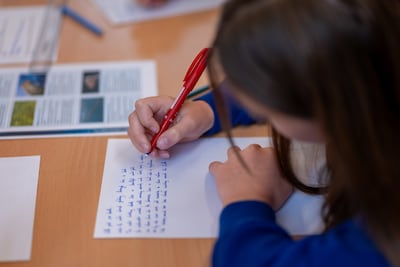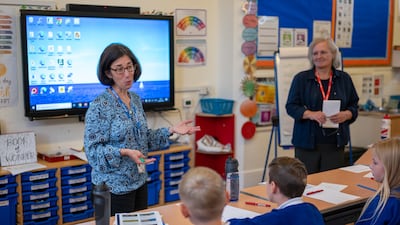Many pupils of the St Just Primary School in Cornwall grew up around beaches and learn how to best protect them from an early age.
But their school is the most westerly in the UK, and their head teacher Demelza Bolton fears they could grow up “isolated” from understanding the global effects of climate change.
“We’re quite isolated from a lot of things within the country,” she told The National. "The children don't experience other cultures like they would if they were in a school in London.
This autumn term, however, pupils in their final year at St Just, aged 11, were paired with a school in the UAE. They met over video links to talk about the coastline near their homes, and exchanged artworks and poems on the subject.
“I wanted to get children thinking on a more global scale about things,” she said.
By sharing their experiences, they learnt about the similarities and differences of living by the sea in northern Europe and the Middle East.
“Our children see Dubai as an absolute world away,” Ms Bolton said. "Although they have quite a lot of similarities because they are coastal, for the children it’s opened their eyes to the wider world."

This was part of a wider exchange of more than 400 children from 13 schools in the UK and UAE, organised by the Emirates Literature Foundation, the UK’s University of Exeter and the University of Khor Fakkan in Sharjah.
Each classroom made special visits to the sandy beaches near their school with marine scientists and artists, to learn about the rich ecosystems there and how they can be protected.
The British artist Kurt Jackson, whose landscape paintings revolve around the sea and ocean life, accompanied the children of St Just for a day out at the beach. “The arts are such a universal language for everyone,” Ms Bolton said.
A selection of the ensuing artworks and poems the children produced were published by the Emirates Literature Foundation in an anthology for Cop28, titled We Are the Ocean.
Ms Bolton was struck by “just how powerful the project has been”.
“It has really opened the children's eyes to global issues, as opposed to their own local community,” she said.
Both the Cornish and Gulf coasts have a high concentration of sea grass meadows, which are home to varied ecosystems.
Though “similar”, these ecosystems have major differences and challenges to their existence, explained Prof John Henrik Stahl, dean of the College of Marine Sciences at Khor Fakkan.
In Cornwall, seagrass meadows have been affected by the use of fertilisers on land, whose nutrients travel through the soil and are released into the sea.
This encourages algae to grow rapidly, which “smothers” the seagrass, Prof Stahl told The National. “The algae covers the meadows and they consume more of the oxygen,” he said.
Other threats included coastal development and dredging.
Pupils in the UAE were taught about the “fragile” coral reefs on their coastline. On the Gulf coast, up to 70 per cent of these have been lost since the late 1990s, due to rising temperatures, coastal development and oil spills.
“We talked about the importance of keeping ecosystems healthy and maintaining high biodiversity,” said Prof Stahl, who taught children from the UAE schools.
It was important to share the university’s research and knowledge with children and “engage” them about marine conservation. “Climate change is intergenerational so its increasingly important to keep children involved in the discussion,” he said.
“We are responsible as adults because we have the knowledge to do something about it."
The children’s curiosity about the ocean seemed endless, Prof Stahl said: “They had so many questions.”

The UAE-based children have been invited to read some of their poems at Cop28 this week, said Emirates Literature Foundation’s founder Isobel Aboulhoul.
“The students and teachers will have opportunities to be part of Cop28 and feel that their voices are heard,” she told The National.
Among these is a performance on Friday to an audience of 3,000 people in the summit’s Green Zone in at Expo City Dubai. This will be alongside a stage production by the Theatre of Others, which is inspired by the University of Exeter’s flagship project for Cop28 entitled We Are The Possible: 12 Poems for 12 Days at Cop28.
While preparing the anthology, Mrs Aboulhoul was struck by how unique every poem and artwork was, and how much the children had grasped from the workshops. “The children understood how much we rely on the ocean to keep our atmosphere healthy,” she said.
She hoped the frank and candid nature of their voices would make an impact at Cop28. “Children are very clear-sighted and able to express themselves without the politeness that we learn as adults. I love that truthfulness about them,” she said.

The project was also devised to support 79 per cent of teachers who want to educate others about climate change but say they do not have the knowledge to do so.
Anita Wood, lecturer at the University of Exeter, said she hoped the project would teach children about their local marine environment but also stress that “they are not alone”.
“All the children in our programme are connected by one ocean,” she told The National.
“Working together has given them a better understanding of themselves, their local marine environment and the knowledge that they are not alone in wanting a better future where our planet and those who live on it can thrive."
Cecilia Manosa Nyblon, the project’s director at the University of Exeter, said the project connected “facts, findings, and feelings” by bringing together arts and science.
“These narratives are brought to life through the arts to embolden us to imagine and take action to forge a liveable future,” she said.


